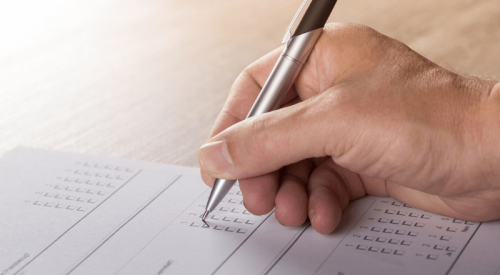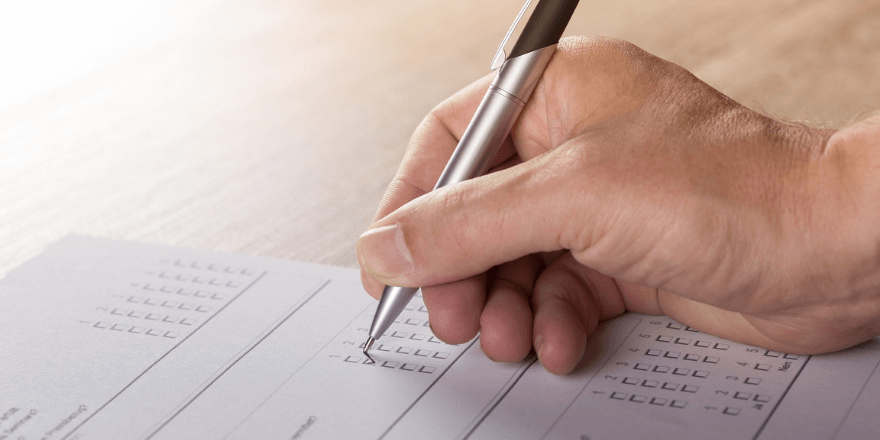
Needing ID could stop LGBTQ+ people voting

The world has changed considerably since the 2019 general election.
The COVID-19 pandemic has deepened existing inequalities faced by marginalised communities; hate crimes based on sexual orientation and gender identity continue to rise; and we are facing a crisis in access to gender-affirming healthcare. It has never been more important that LGBTQ+ communities, and all marginalised people, are empowered to use their vote.
In June 2021, the UK Government introduced its Elections Bill, which would require voters to present photo identification (ID) to vote in general elections, English local elections, and police and crime commissioner elections in England and Wales. Our research shows that these proposals would disproportionately affect LGBTQ+ people.
At Stonewall, we are proud to have partnered with LGBT Foundation on a crucial and timely piece of research into ID ownership amongst LGBTQ+ communities, the first of its kind in the UK. Download the full report.
This report shows that the proposed Voter ID requirements would disproportionately affect LGBTQ+ people.
The report shows that LGBTQ+ people are three times more likely than the general population not to possess any photo ID that could be used to vote. This disparity is driven by the figures for trans and non-binary people. Nearly a quarter of trans respondents (24%) and nearly one in five non-binary respondents (19%) said they do not own usable photo ID, and could potentially be disenfranchised by the Elections Bill. This compares to 3% of non-trans respondents.[1]
Nearly a quarter of trans respondents and nearly one in five non-binary respondents said they do not own usable photo ID.
For many trans, non-binary and gender non-conforming people, the photograph, name, and/or gender marker on their ID may not reflect their appearance or gender identity. Nearly two in five trans respondents (38%) and over one-third of non-binary respondents (35%) have previously experienced problems getting their ID accepted.
The introduction of voter ID could inadvertently result in them being turned away from polling stations, or simply deciding not to vote for fear of this happening: over half of trans and non-binary respondents (55% and 52% respectively) said that they would be less likely to vote if they had to present ID. LGBTQ+ disabled people, people of colour, and those who are homeless or in severe poverty are also more likely to face barriers to voting under the UK Government’s proposed legislation.
The Government claims that the Elections Bill is necessary to ensure that elections are safe and secure, and protect against ‘personation’, a form of electoral fraud where someone pretends to be somebody else in order to use their vote. However, there are extremely low levels of electoral fraud in the UK. In 2019, there were only 33 allegations of ‘personation’ out of over 58 million votes cast, resulting in just one conviction and one caution.
The Bill would disenfranchise far more legitimate voters than it would prevent fraudulent ones. In the 2018 trials of voter ID that took place across five councils, twice as many people did not vote in a single day due to having incorrect ID as have been accused of personation in eight years across the whole of the UK.
96% of trans and non-binary people experience at least one barrier to obtaining appropriate ID.
Our report’s findings also point to wider systemic barriers for LGBTQ+ people’s access to ID, particularly for trans, non-binary and gender non-conforming people. Our research found that 96% of trans and non-binary people experience at least one barrier to obtaining appropriate ID. They highlighted the difficulty of obtaining ID that reflects their chosen name and gender. Changing the gender marker on a UK passport currently requires a Gender Recognition Certificate, a new birth or adoption certificate, or a letter from a doctor or medical professional. This process can be lengthy, complex and expensive, with an average 18-month wait for a first appointment at a Gender Dysphoria Clinic. Respondents were also concerned about the risk to their privacy and safety in obtaining ID – for example, being ‘outed’ as trans, or being subject to invasive questioning.
Not only will we campaign against the Government’s Voter ID proposals, but we will also campaign to make it easier and more affordable for all trans people, including non-binary people, to access identity documents that accurately reflect their lived name and gender – and ensure they continue to have a voice on the issues that affect their lives.